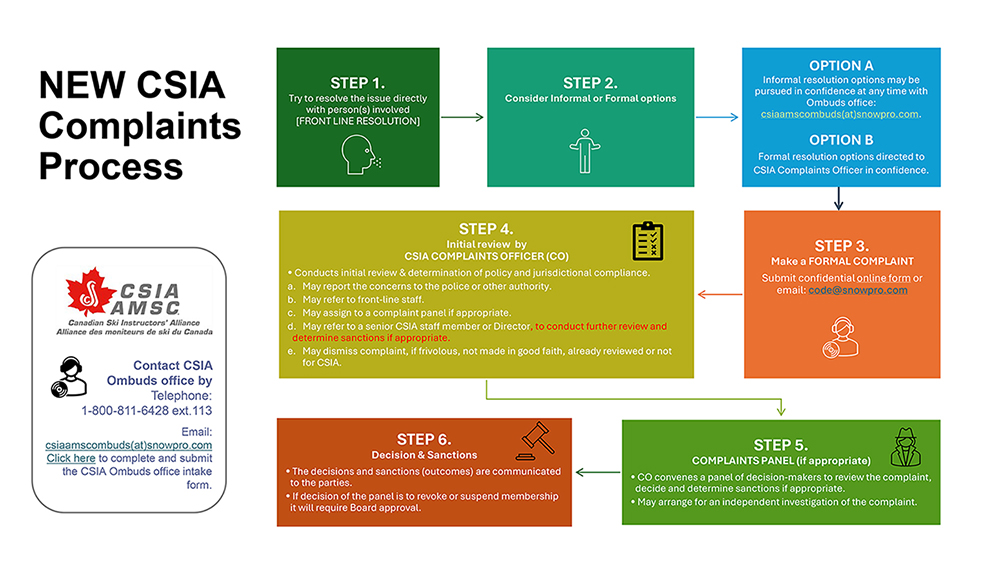
CSIA Code of conduct and complaints webinar (January 16, 2025) :Click here
The CSIA Ombuds Office
The mandate of the Office of the Ombuds (the “Ombuds Office”) is to assist in the informal resolution of concerns and complaints related to the application of CSIA policies, rules, and procedures, ensuring that all members of the CSIA community are treated in a fair and equitable manner within the CSIA. The ombuds office is independent, confidential, impartial and accountable. (click here to read the complete function and description of the ombuds office)
The Ombuds Office strives to promote a fair, respectful, inclusive, and supportive culture within the CSIA.
What we can do
- Provide information, advice, coaching, and/or referrals to resolve complaints or issues
- Facilitate discussions to resolve concerns or complaints
- Conduct independent and impartial fact-finding /investigations
- Formulate and submit individual or systemic formal recommendations to remedy an identified injustice or inequality
- Act as a mediator facilitator to resolve a conflict and build bridges towards solutions when communication is poor
What we cannot do
- Intervene if you have not exhausted all internal administrative remedies or in an ongoing internal administrative proceeding
- Provide legal advice or act as a representative
- Reverse a decision or impose a decision.
- Intervention/case review is not possible when the community member has already exercised recourse before a court or an administrative tribunal or formal notice
Who can use the services:
Members of the CSIA community include employees, course conductors, members and volunteers serving on committees (of the CSIA or its regions).
The services are provided in English and in French
Contact CSIA Ombuds office by
Telephone: 1-800-811-6428 ext.113
Email us at
Click here to complete and submit the intake form.
Who we are

Julie Boncompain
A lawyer in practice for the last 21 years who has developed expertise in dispute prevention and resolution (DRP) as well as conflict management in the areas of education, labor and business law.
Currently Co-founder of JustEquitable since 2021, acting as the Protector of Rights (Ombudsman) at Polytechnique Montréal since 2020, ombudsman for the research center in artificial intelligence-Mila in Montreal and has undertaken mediation and arbitration mandates for non-profit organizations, private and para-public companies as a consultant. She is on the Executive Committee of the Association of Canadian College and University Ombudspersons (ACCUO) since 2019 and chairs the Association des ombudsman en enseignement supérieur du Québec(AOESQ) since 2020.

Brent Epperson
Brent is an Assistant Professor of Conflict Studies at Saint Paul University in Ottawa, Ontario, and a practicing ombuds in Europe and North America. Co-founder of JustEquitable since 2021, his public policy focuses on ombuds practice, public governance (health and higher education sectors), and issue framing. He has served as the first ombuds role at the University of Luxembourg since 2021 and previously works as an ombuds at the University of Alberta.
What are our values?
- Collaboration
- Prevention
- Active listening
How we operate?
We ensure the office respects the following principles:
Independence
- The Ombuds operates independently from the organization. Annual reports are presented to the Board
- The Ombuds is not aligned with CSIA management or any particular business or operational unit of CSIA
Impartiality
- The Ombuds is impartial, does not take sides and promotes fairness
- The ombuds reviews facts objectively, without any bias for or against the issue under review
Informality
- The Ombuds operates informally whenever possible to resolve concerns
- The ombuds will decline to participate in or give evidence to any formal adjudicative or administrative processes related to concerns brought to its attention
Confidentiality
- The Ombuds will deal with matters in confidence manner at all times. Unless there is an imminent risk of serious harm to oneself, to the community member or others that make disclosure necessary in accordance with ombuds best practices.


